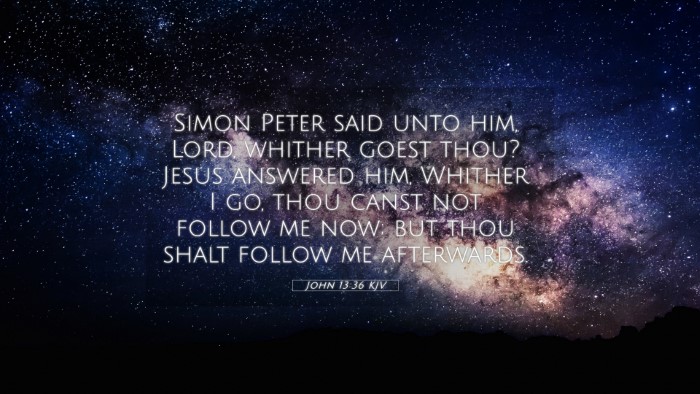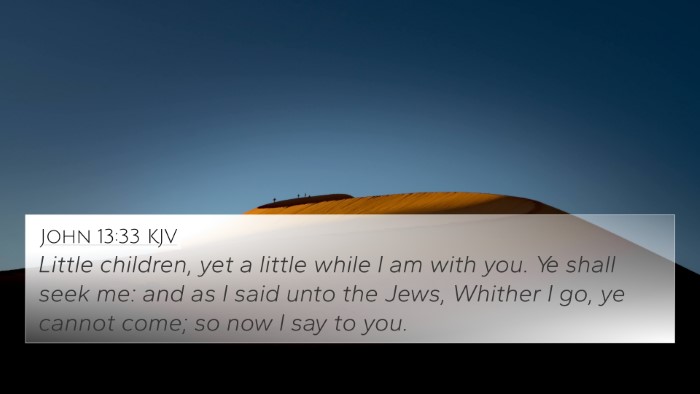Understanding John 13:36
In John 13:36, we encounter a profound moment of dialogue between Simon Peter and Jesus. The verse states,
"Simon Peter said to Him, 'Lord, where are You going?' Jesus answered him, 'Where I am going, you cannot follow Me now, but you shall follow Me afterward.'"
This interaction takes place on the eve of Jesus' crucifixion, setting the stage for significant themes of discipleship, sacrifice, and future hope.
This verse encapsulates Peter’s confusion and concern regarding Jesus’ impending departure. Jesus, in His response, points to the limitations of Peter’s understanding and readiness at that moment, while simultaneously offering a glimpse of hope for future discipleship.
Context and Background
The immediate context of John 13 involves the Last Supper, a pivotal gathering where Jesus begins to prepare His disciples for His impending death. The chapter is rich in themes of service, love, and the establishment of a new covenant.
Peter’s question, "Lord, where are you going?" reflects his desire to accompany Jesus, demonstrating deep loyalty but also a misunderstanding of the necessity of Jesus’ sacrifice. For Peter and the other disciples, the thought of Jesus leaving was disconcerting, marking a turning point in their journey together.
Thematic Insights
- Discipleship and Following Christ: The call to discipleship is evident as Jesus indicates that Peter will follow Him one day. This denotes the inevitable journey of faith that each believer must undertake.
- Limitations of Human Understanding: Peter’s question highlights a crucial aspect of human experience—our limited perspective on divine plans. As illustrated in this verse, there are times when believers will not fully understand God's purpose.
- Hope for the Future: While the immediate context seems bleak, the promise that Peter would follow Jesus later establishes a foundation of hope, underscoring the transformative journey of a believer.
Key Cross References
- Matthew 16:24-25: Jesus calls His followers to take up their cross, emphasizing the cost of discipleship.
- John 14:2-3: Jesus speaks about His departure and prepares a place for His followers, offering reassurance of His ongoing care.
- John 21:18-19: Jesus later tells Peter how he will glorify God by his future martyrdom, affirming that he will follow Him ultimately.
- Acts 1:9-11: The ascension of Jesus reinforces the promise that believers will eventually join Him.
- Romans 8:18: Paul speaks of future glory that outweighs present sufferings, echoing the hope Jesus communicates.
- Philippians 3:20-21: Paul illustrates that believers are citizens of heaven and will be conformed to Christ’s image in the future.
- 1 Peter 2:21: Peter later reflects on following Jesus’ example, illustrating his journey of understanding.
Commentaries on John 13:36
Matthew Henry's Commentary:
Matthew Henry draws attention to Peter’s readiness to follow Jesus and his subsequent confusion. He emphasizes the transformational journey that Peter will undergo, shifting from misunderstanding to ultimate faithfulness. Henry notes that Peter’s question and Jesus’ response signal a deeper truth: faith often requires trusting what lies beyond our immediate understanding.
Albert Barnes' Notes:
Barnes highlights the prophetic nature of Jesus' words. Jesus acknowledges Peter’s limitations while providing him with a promise of future companionship with Him. Barnes stresses the importance of recognizing that faithfulness may not always lead to immediate understanding, yet believers are called to trust in God's perfect timing.
Adam Clarke's Commentary:
Clarke provides a pastoral insight into Peter's character, underscoring his passionate heart for Jesus. He explains that the discourse reveals a deeper layer of commitment in discipleship—voluntary suffering and sacrifice are essential to truly follow Jesus. Clarke notes that the tension between human emotion and divine purpose is a central theme in this interaction.
Applying John 13:36 to Modern Faith
For modern-day believers, John 13:36 serves as a reminder of the call to faithful discipleship amid uncertainty. Just as Peter grappled with the unpredictability of Jesus' path, Christians today often confront similar challenges in their faith journeys. The reassurance that followers of Christ are ultimately called to a greater purpose can embolden believers to trust in God’s plans, even when they might lead them through trials or confusion.
Conclusion
John 13:36 is rich with theological implications and serves as a critical point in the narrative of Jesus’ ministry. The interplay between Peter’s longing to accompany Jesus and the enigmatic nature of Jesus’ mission invites believers to reflect on their journeys of faith. As we explore the connections between scripture and the broader themes of the Christian faith, let us be encouraged to engage in comparative Bible verse analysis, facilitating a deeper understanding of God’s overarching narrative throughout both the Old and New Testaments.
Further Reflections
For anyone studying the Scriptures, tools for Bible cross-referencing can enhance your study:
- Using a Bible concordance can help locate themes and topics that resonate with John 13:36.
- Employing a Bible cross-reference guide can unveil thematic connections with other verses.
- Engaging in cross-referencing Bible study methods enriches understanding of scriptural dialogues.
- Consider developing your Bible reference resources to create personalized links between passages that speak to particular themes.









